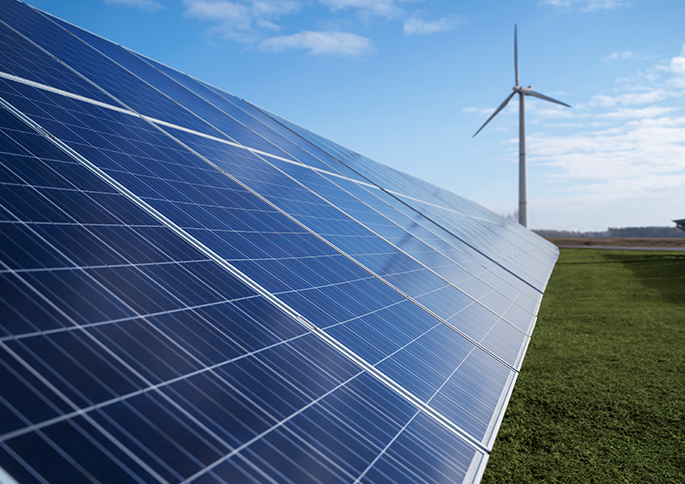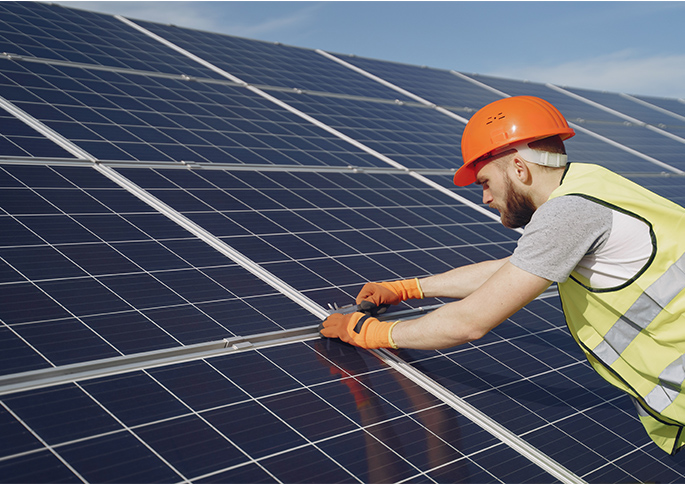Solar panels operate by capturing the energy emitted by the sun and transforming it into electrical power using the photovoltaic phenomenon. Here's a basic overview of all commercial & industrial solar panel work and the installation requirements:
Photovoltaic (PV) Cells: Solar panels are made up of many individual solar cells, typically composed of semiconductor materials such as silicon. These PV cells contain two layers of silicon, one with an excess of electrons (negative) and the other with a deficit of electrons (positive).
Absorption of Sunlight: When sunlight hits the PV cells, it consists of tiny particles of energy called photons. These photons are absorbed by the semiconductor material in the solar cell.
Generation of Electron-Hole Pairs: The energy from absorbed photons excites electrons in the semiconductor material, causing them to break free from their normal positions in the atoms. This creates electron-hole pairs, where one electron becomes free (negative charge), and the atom left behind has a positive charge.
Flow of Electrons: The electric field within the PV cell causes these free electrons to move toward the front surface of the cell, while the holes move toward the back surface. This movement of electrons creates an electric current.

Electrical Output: Metal conductive plates on the sides of the cell collect the electrons, creating an electrical current. This current can then be captured and used as electricity.
Installation Requirements:

Location: Home solar panels require a location with access to direct sunlight for most of the day. The ideal location is one with minimal shading from trees, buildings, or other obstructions. The geographical location also affects the amount of sunlight received throughout the year.
Roof Structure: Solar panels are commonly installed on rooftops. The roof should be in good condition and able to support the weight of the panels. If not, additional structural support may be required.
Orientation: The orientation of the solar panels is crucial. In the Northern Hemisphere, panels should generally face south to maximize sunlight exposure. However, the optimal orientation may vary depending on your location and energy needs.
Tilt Angle: The tilt angle of the panels should be adjusted based on your latitude to maximize energy production. This angle allows the panels to capture sunlight at the most effective angle throughout the year.
Inverter: Solar panels generate direct current (DC) electricity, while most homes use alternating current (AC) electricity. An inverter is needed to convert DC to AC so that the electricity generated can be used in your home or fed back into the grid.
Wiring and Electrical Work: Proper wiring and electrical connections are critical to ensure the safety and efficiency of your solar panel system. This often requires the expertise of a licensed electrician.
Permits and Regulations: Before installation, you may need to obtain permits and comply with local building codes and regulations related to solar panel installations.
Expert tips for solar panel installation and maintenance
Maintenance: Solar panels generally require minimal maintenance but should be periodically cleaned and inspected for damage or dirt that may reduce their efficiency.
Financial Considerations: Solar panel installations can be expensive, so you should consider financing options, government incentives, and the potential return on investment in terms of reduced energy bills and potential income from selling excess electricity back to the grid.
It's important to consult with a professional solar panel manufacturer or installer to assess your specific needs, site conditions, and local regulations before proceeding with a solar panel installation. They can provide guidance and ensure that your solar panel system is designed and installed correctly to maximize its benefits.
Benefits of Installing Solar Panels
Installing solar panels on your property offers numerous benefits, both environmentally and economically. Here are some of the key advantages of using solar panels:
Clean and Renewable Energy:
Solar panels generate electricity using sunlight, a virtually unlimited and renewable resource. This reduces the reliance on fossil fuels, which produce greenhouse gas emissions and contribute to climate change.
Lower Electricity Bills:
Solar panels can significantly reduce your monthly electricity bills. By generating your electricity, you can offset or even eliminate your need to purchase power from the grid, depending on the size of your solar system.
Return on Investment:
While the initial cost of purchasing and installing solar panels can be substantial, they often provide a solid return on investment (ROI) over time. The energy savings and potential income from selling excess electricity back to the grid can pay off the upfront costs.
Energy Independence:
Solar power allows you to become more energy independent. You're less susceptible to fluctuations in energy prices and can generate your electricity, reducing your reliance on utility companies.
Environmentally Friendly:
Solar energy is a clean and sustainable energy source. It produces no greenhouse gas emissions or air pollution, helping to combat climate change and reduce the carbon footprint of your home or business.
Reduced Energy Demand:
Solar panels can help reduce the overall demand for electricity on the grid, particularly during peak hours. This can lead to a more stable and reliable energy supply for everyone.
Government Incentives:
Numerous governmental bodies provide financial inducements, tax deductions, and refunds as incentives to promote the adoption of solar panel systems. These incentives can significantly lower the upfront costs and improve the financial viability of solar projects.
Increased Property Value:
Solar panels can increase the resale value of your property. Homes and businesses with solar installations are often more attractive to potential buyers due to lower energy costs and a reduced carbon footprint.
Energy Storage Options:
When combined with energy storage systems (such as batteries), solar panels allow you to store excess energy for use during periods of low sunlight or during power outages. This enhances the reliability of your energy supply.
The solar industry generates jobs in manufacturing, installation, and maintenance. As more people adopt solar energy, it contributes to job growth in the renewable energy sector.
Community and Environmental Impact:
Solar panels contribute to a cleaner environment and a more sustainable future. By setting an example, you can inspire others in your community to adopt clean energy practices.
Long Lifespan:
Solar panels have a long lifespan, typically lasting 25 years or more with minimal maintenance. This means you can enjoy their benefits for decades.
While commercial and industrial solar panels offer many advantages, it's essential to consider factors such as your location, energy consumption, budget, and available incentives when deciding whether to install a solar panel system. Additionally, consulting with a reputable solar installer can help you assess the feasibility and potential benefits of going solar for your specific situation.
Why Contendre Solar?
"Contendre Solar" is a company that provides solar energy solutions. They distinguish themselves through several key qualities and attributes that set them apart in the industry:
Sustainability:
Contendre Solar is committed to promoting sustainability and reducing the carbon footprint. They offer clean, renewable energy solutions that help clients transition to eco-friendly power sources, contributing to a greener and more sustainable future.
Quality:
Quality is a top priority for Contendre Solar. They offer high-quality solar panels and equipment that are known for their reliability and efficiency. Our solar products are designed to withstand various environmental conditions, ensuring long-term performance and customer satisfaction.
Innovation:
Contendre Solar Panel Manufacturing Company embraces innovation in their solutions. They stay at the forefront of technological advancements in the solar industry, providing clients with the latest, most efficient solar panels and energy storage options. Their commitment to innovation allows customers to benefit from cutting-edge technology.
Customer Satisfaction:
Customer satisfaction is central to Contendre Solar's ethos. They prioritize excellent customer service, ensuring that clients receive personalized guidance throughout the installation process. Their team is responsive to inquiries, addresses concerns promptly, and offers ongoing support, creating a positive and satisfying experience for customers.
Adaptability:
Contendre Solar understands that each customer's energy needs and circumstances are unique. They offer adaptable solutions that can be tailored to fit various residential, commercial, and industrial requirements. This flexibility allows clients to choose the solar energy system that best suits their specific situation.
Responsibility:
Contendre Solar is a responsible corporate citizen. They adhere to ethical business practices and prioritize safety and compliance. Their commitment to responsible business extends to environmental responsibility, including the responsible disposal of solar components and the recycling of materials.
Contendre Solar's focus on sustainability, quality, innovation, customer satisfaction, adaptability, and responsibility positions them as a reputable and forward-thinking company in the solar energy industry providing solutions for Industrial Solar Panels, Commercial and Residential Solar solutions. Clients can rely on them for reliable and efficient Commercial & Industrial solar rooftop energy solutions that align with their environmental goals and energy needs.







